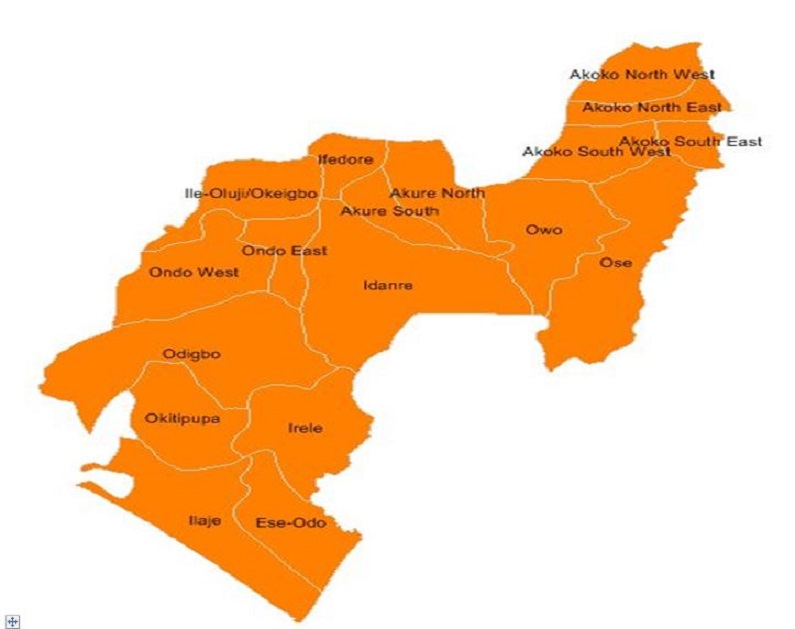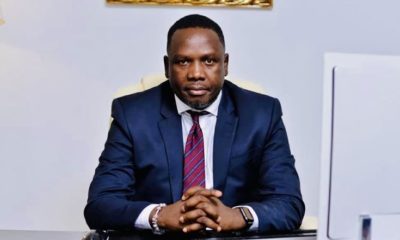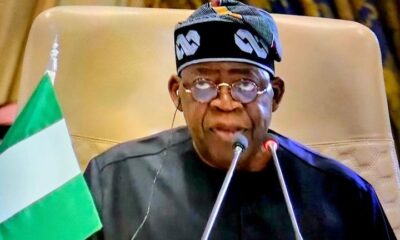NEWS
Tinubu Unveils 2024 Budget Proposal [Full Speech]

President Bola Tinubu presented the N27.5 trillion 2024 budget proposal to the 10th National Assembly in Abuja on Wednesday.
This marks his first such presentation since taking office six months ago.
Full speech below:
1. In furtherance of my sacred duties and obligations as President of the Federal Republic of Nigeria, it is my honour to be here today to present my administration’s 2024 Budget Proposal to this Joint Session of the 10th National Assembly. This moment is especially profound and significant to me because it is my first annual budgetary presentation to the National Assembly.
2. Distinguished Senators and Honourable Members of the National Assembly, I commend your swift consideration and passage of the 2023 Supplementary Appropriation Bills and the 2024-2026 Medium Term Expenditure Framework and Fiscal Strategy Paper.
“Your prompt action underscores your devotion to economic development and to the greater welfare of our people. It also highlights your desire to work in close collaboration with the Executive branch. We do not serve ourselves. We must always strive to work together to serve and benefit the people of our beloved country.
3. I am confident that the National Assembly will continue to work closely with us to ensure that deliberations on the 2024 Budget are thorough but also concluded with reasonable dispatch. Our goal is for the Appropriation Act to come into effect on the 1st of January 2024.
4. It is, by now, a matter of recorded history that my very first fiscal intervention as President of this great nation was to end the fuel subsidy regime which had proven to be so harmful to the overall health of our national economy.
“The second was to negotiate and subsequently present a supplementary budget to enable my government to fund the items needed to restore macro-economic stability and mitigate the harsh impact of subsidy removal.
5. The third was to secure a second supplementary budget, this time to enable us to keep our promises to promote national security, invest in infrastructure and provide much-needed support to the most vulnerable households in our society.
6. In swearing in my cabinet and reflecting on the unique challenges facing us, I invited the Ministers to imagine that we are attempting to draw water from a dry well.
“Today, I stand before you to present our Budget of Renewed Hope; a budget which will go further than ever before in cementing macro-economic stability, reducing the deficit, increasing capital spending and allocation to reflect the eight priority areas of this Administration.
“The budget we now present constitutes the foundation upon which we shall erect the future of this great nation.
7. Economic conditions remain challenging both abroad and at home. Despite lingering post-COVID supply and production bottlenecks, armed conflict in various parts of the world and restrictive monetary policies in major economies, we expect global growth to hover around 3.0 percent in 2024. This relatively low rate has significant implications for our economy due to our current reliance on importation.
8. Distinguished Senators, Honourable Members: despite the global headwinds, the Nigerian economy has proven resilient, maintaining modest but positive growth over the past twelve months.
9. Inflation has trended upward due to weak global conditions. To contain the rising domestic prices, we will ensure effective coordination of fiscal and monetary policy measures, and collaborate with sub-national governments to address structural factors driving inflation in Nigeria.
10. The Budget proposal meets our goal of completing critical infrastructure projects which will help address structural problems in the economy by lowering the costs of doing business for companies and the cost of living for the average person, The Honourable Minister of Budget and Economic Planning will provide full details of this proposal.
11. Distinguished Senators and Honourable Members, an aggregate revenue of 11.045 trillion naira was projected to fund the 2023 Budget of 24.82 trillion naira with a deficit of about 6.1 percent of GDP.
12. As of September 30, the Federal Government’s actual aggregate revenue inflow was 8.65 trillion naira, approximately 96 percent of the targeted 8.28 trillion naira.
13. Despite the challenges, we continue to meet our obligations.
14. Distinguished Senators, Honourable Members, permit me to highlight key issues relating to the budget proposals for the next fiscal year. The 2024 Appropriation has been themed the Budget of Renewed Hope. The proposed Budget seeks to achieve job-rich economic growth, macro-economic stability, a better investment environment, enhanced human capital development, as well as poverty reduction and greater access to social security.
15. Defence and internal security are accorded top priority. The internal security architecture will be overhauled to enhance law enforcement capabilities and safeguard lives, property and investments across the country.
16. Human capital is the most critical resource for national development. Accordingly, the budget prioritizes human development with particular attention to children, the foundation of our nation.
17. To improve the effectiveness of our budget performance, the government will focus on ensuring value for money, greater transparency and accountability. In this regard, we will work more closely with development partners and the private sector.
18. To address long-standing issues in the education sector, a more sustainable model of funding tertiary education will be implemented, including the Student Loan Scheme scheduled to become operational by January 2024.
19. A stable macro-economic environment is important to catalyse private investment and accelerate economic growth. We have and shall continue to implement business and investment-friendly measures for sustainable growth.
20. We expect the economy to grow by a minimum of 3.76 percent, above the forecasted world average. Inflation is expected to moderate to 21.4 percent in 2024.
21. In preparing the 2024 Budget, our primary objective has been to sustain our robust foundation for sustainable economic development. A critical focus of this budget and the medium-term expenditure framework is Nigeria’s commitment to a greener future.
22. Emphasizing public-private partnerships, we have strategically made provisions to leverage private capital for big-ticket infrastructure projects in energy, transportation and other sectors.
“This marks a critical step towards diversifying our energy mix, enhancing efficiency, and fostering the development of renewable energy sources.”
NEWS
Tinubu Not To Blame For North’s Challenges – Ex-Kaduna Speaker

Hon. Yusuf Ibrahim Zailani, former Speaker of the Kaduna State House of Assembly, has defended President Bola Ahmed Tinubu against criticisms over the difficulties facing Northern Nigeria.
He argued that the North has received substantial financial support through regional development commissions and should focus on utilizing these resources effectively.
Zailani made this statement while speaking to journalists after receiving Alhaji Yerima Shettima, President-General of the Arewa Youth Consultative Forum (AYCF), who visited to offer condolences following the passing of his stepmother, Hajia Fatima Abdullahi (Goggu Ladi).
READ ALSO: Dangote Peugeot Begins 3008 GT Assembly In Kaduna
He noted that Tinubu’s administration had provided significant financial backing to the North, particularly through the creation of regional development commissions, each receiving ₦750 billion annually—totaling ₦2.25 trillion for the region.
“President Tinubu has, in his own way, liberated the North from poverty and underdevelopment.
“With an annual budget of ₦750 billion allocated to each of the North’s three development commissions—totaling ₦2.25 trillion annually—the North has no reason to struggle with poverty, unemployment, and underdevelopment,” Zailani stated.
He pointed out that if these funds were used efficiently, they could transform key sectors such as power, agriculture, and industrialization.
He cited an example where ₦200 billion could generate 100 megawatts of solar power, while investments in fertilizer blending plants and research could boost agricultural productivity.
Zailani stressed the need for accountability, urging Northerners to shift their focus from blaming the Federal Government to questioning the performance of their own development commissions.
“Instead of constantly questioning what the Federal Government is doing or not doing, we should be asking what our development commissions are doing with the allocated funds,” he said.
Addressing concerns about the Proposed Tax Reforms Bill, which some argue favors industrialized states like Lagos, Zailani encouraged the North to take advantage of its development funding and focus on self-sufficiency.
“Now that we have been empowered with development commissions, let us build our own industries and generate our own taxes instead of complaining,” he added.
He also commended Kaduna State Governor Uba Sani for his efforts in infrastructure development, particularly his directive for the construction of 20 kilometers of asphalt roads in each constituency.
He called on AYCF and similar organizations to collaborate with the government to drive progress in the region.
In response, Alhaji Yerima Shettima offered prayers for the late Hajia Fatima Abdullahi and reaffirmed AYCF’s commitment to ensuring transparency and accountability in governance.
“We will continue to uphold the truth and ensure justice for all,” Shettima stated.
NEWS
Lagos To Shut Independence/Mekwen Bridge For Two Months

The Lagos State Government has announced the closure and diversion of traffic on the Independence/Mekwen Bridge (inbound Marina/CMS route) for two months to allow for emergency repairs.
In a statement on Sunday, the Commissioner for Transportation, Oluwaseun Osiyemi, disclosed that the repair work would commence on Wednesday, March 19, and run until Monday, May 26, 2025.
As a result, the section of the road from the National Open University of Nigeria (NOUN) through Bonny Camp Bridge down to Independence Bridge will be closed to vehicular movement.
READ MORE: Woman Jumps Into Lagos Lagoon, Recovered Dead
Additionally, the Bonny Camp Underpass Bridge service lane inbound Independence Bridge will not be accessible to motorists. However, the service lane from Ahmadu Bello Way to Ozumba Mbadiwe will remain open.
To ease traffic congestion, the government has provided alternative routes for motorists.
“For motorists heading to Victoria Island from Ahmadu Bello Way, Osiyemi advised using Ozumba Mbadiwe Avenue inbound Akin Adesola Street, then proceeding to Falomo Roundabout and linking Obafemi Awolowo Road to access Ring Road.
“Those traveling to the 3rd Mainland Bridge from Ahmadu Bello Way should go through Ozumba Mbadiwe Avenue inbound Akin Adesola Street, then link Alfred Rewane Road to Osborne Road before connecting to Ring Road.
“Motorists heading to Inner Marina and CMS from Ahmadu Bello Way will be diverted through Ozumba Mbadiwe Avenue inbound Akin Adesola Street to connect Falomo Roundabout, then link Obafemi Awolowo Road to access J.K. Randle Road/King George V Road.
Osiyemi assured that traffic management personnel would be deployed to regulate movement during the repair period.
“Motorists heading to Ahmadu Bello Way from Inner Marina/CMS will have through-traffic access,” he said.
The commissioner also reaffirmed the government’s commitment to ensuring minimal disruption, stating that officers of the Lagos State Traffic Management Authority (LASTMA) will be on the ground to manage traffic flow along the affected routes.
The state government urged residents to plan their journeys accordingly and comply with the alternative routes to ease congestion during the two-month repair period.
NEWS
Ondo State To Employ 1,100 Primary School Teachers

Governor Lucky Aiyedatiwa of Ondo State has approved the recruitment of 1,100 primary school teachers to fill vacancies in public schools across the 18 local government areas of the state.
The announcement was made in a statement on Sunday by Bolu Ajijo, the Director of Information and Public Relations at the Ondo State Universal Basic Education Board (SUBEB).
According to the statement, the approval was granted after the completion of the recruitment process.
READ ALSO: JUST IN: Nine Abducted Surveyors Freed In Ondo After N20m Ransom Payment
“As part of deliberate efforts to fill critical vacancies in public primary schools across the state, Ondo State Governor, Lucky Aiyedatiwa, has approved the employment of one thousand one hundred teachers by the Ondo State Universal Basic Education Board,” the statement read.
Reacting to the decision, the Executive Chairman of Ondo SUBEB, Victor Olambitan, commended the governor for addressing the shortage of teachers in the state’s public schools.
“The employment will go a long way in improving the pupil-teacher ratio in our public primary schools and, at the same time, enhance the quality of education delivered in schools, especially in rural and hard-to-reach areas across the state,” Olambitan stated.
He also assured applicants that details on how to check the list of successful candidates and begin the documentation process would be made public soon.





















